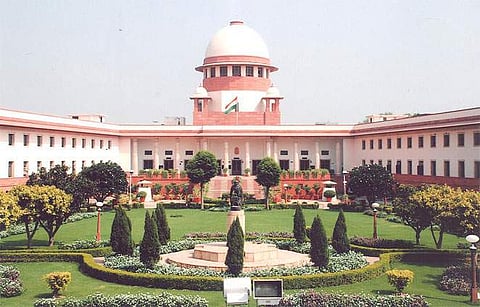

The Supreme Court on Thursday said that every district in India that has more than 100 cases under the Protection of Children from Sexual Offences Act (POCSO) will set up exclusive courts to try these cases. During the course of the proceeding, it also came to light that the National Commission for Protection of Child Rights (NCPCR), mandated to monitor the implementation of POCSO, does not have any data for the past seven years. The latest publicly available data on POCSO — the National Crime Records Bureau's Crime in India 2016 — is also three years old.
Supreme Court Registrar Surinder S Rathi collated data from various sources and found out that from January 1 to June 30 this year, 24,212 FIRs were filed across India. Of these, 11,981 were still being probed by the police and in 12,231 cases, the police had filed the charge sheets. Trails had commenced in 6,449 cases only and yet to commence in 4,871. Till now, the trial courts had decided only 911 cases, that is, about 4% of the total cases registered.
Almost 1.5 lakh cases registered under the POCSO Act are pending — Uttar Pradesh being the worst offender with over 44,000 pending cases since November 2012. Maharashtra is second with over 19,000 pending cases. Rathi's study concluded that Mizoram had the best disposal rate — 52 per cent. Rathi added that the number of pending cases would need six years to complete — considering no cases are filed in the meanwhile.
The latest data available with the NCRB shows that 1,64,387 cases of Crime Against Children were pending in 2016 while 63,352 cases were sent for trial in that year — making it a total of 2,27,739 cases that were to be tried in 2016. Out of these 70,435 cases passed down from the previous year falls under POCSO. The year 2016 saw 30,891 cases of POCSO being registered making it a total of 1,01,326 awaiting trail in 2016. According to the same data, the pendency rate at the police investigation stage is 31 per cent while 89 per cent of the total cases were still pending.
The bench headed by Chief Justice of India Ranjan Gogoi's direction came on a suo moto case taken by it owing to concern about the increasing instances of child rapes.
During the hearing, the bench directed that the exclusive courts be set up under a central scheme which will have support persons who play an important role between the child victim and the court's officers and investigators and they should be qualified for the same too. Centre had already stated that it would establish 1,023 special fast-track courts to try cases under POCSO.
The court told Solicitor General Tushar Mehta that the courts should start within 60 days and said, "Centre has to make money available for this." The case has been slated for further hearing on September 26 and asked the Centre to file its status report in four weeks time. Senior advocate V Giri who was appearing as amicus curiae in the case in his status report stated that the juvenile courts are different from regular courts and there is an urgent need to sensitise judges and prosecutors dealing with such cases.
While noting the infrastructural challenges in setting up POCSO-exclusive courts, CJI Gogoi observed that courts still use curtains to keep the victim and accused apart and said, "There is usually just a curtain dividing the accused and victim in such courts where the victim is questioned by the Special Public Prosecutor."When the central government informed the bench that two-child exclusive courts is already functioning in Delhi's Saket district court which has necessary architectural changes of separate enclosures for the victim and accused. But, CJI said, "We are concerned about states where there is hardly any infrastructure. "The court also ordered the directors of the existing forensic labs to deal with POCSO case evidence promptly to cause no delay in the probe or trial of such cases but didn't pass any directions on whether there is a need to have exclusive forensic labs for POCSO cases in each district, as there was usually a delay of six to eight months in filing such a report.
